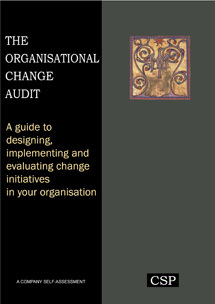Communicating ChangeEffective communication remains the most obvious success factor for change management in an organisation, yet it is also often the most poorly managed and the most likely to bring the change project to a grinding halt. The communication message should be built around the following four issues: the precise nature of the change ~ the potential advantages and benefits of the proposed change ~ how and when the change will take place ~ the people aspects of the change.
Each of these issues requires separate attention in developing a communication strategy and this column can only call attention to the imperative need for effective communication of the change plan to everyone involved. This will help to overcome the inevitable resistance and encourage active participation from employees across the organisation. In preparing the communication strategy for any change programme, the team in charge of the initiative should look at each issue in detail, including answering the following 14 “Must-Ask” questions. It may seem that, if the initiative has been well prepared, the answers will be obvious. However, they are often overlooked. In addition, these are the questions that the change team will most often be asked by staff. If the team is not able to answer them clearly, quickly and convincingly the change programme has little chance of success. The team should ask itself (and be prepared to answer) the following questions: What is the precise nature of the change?
What will be the advantages and benefits of the change?
How and when will the change take place?
What are the people aspects of the change?
These questions are derived from The Organisational Change Audit - a fully scoreable, self-assessment audit from Cambridge Strategy Publications. |
Explore |


